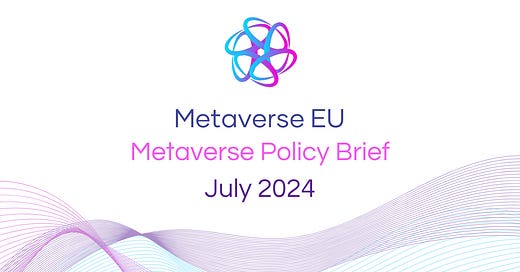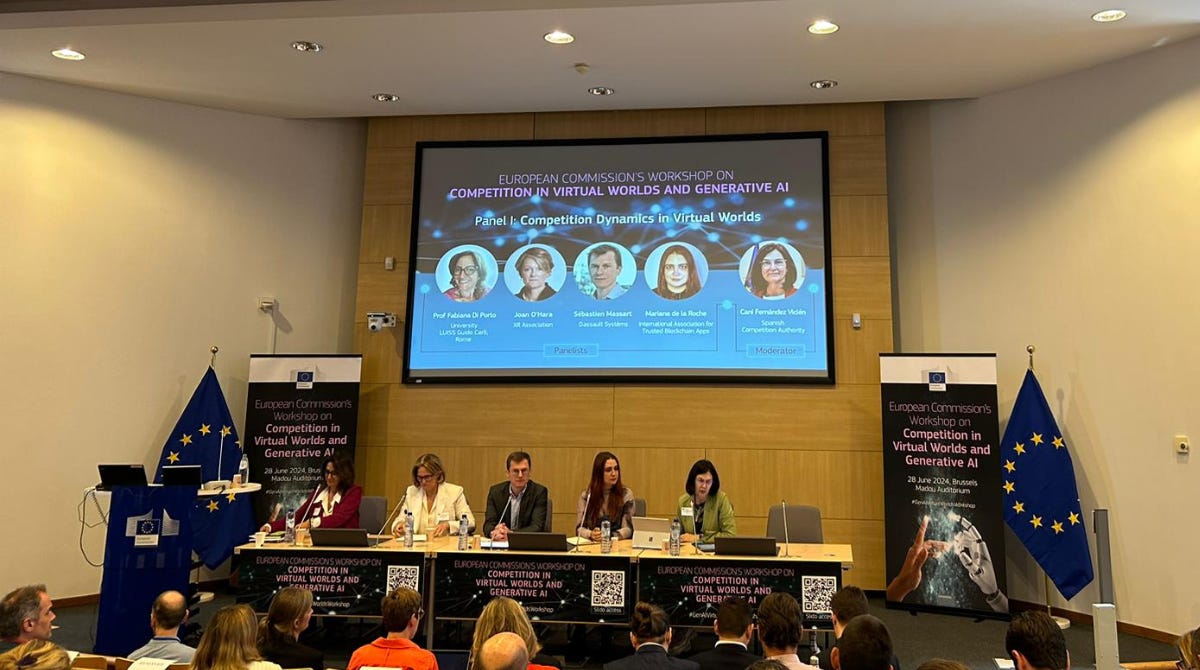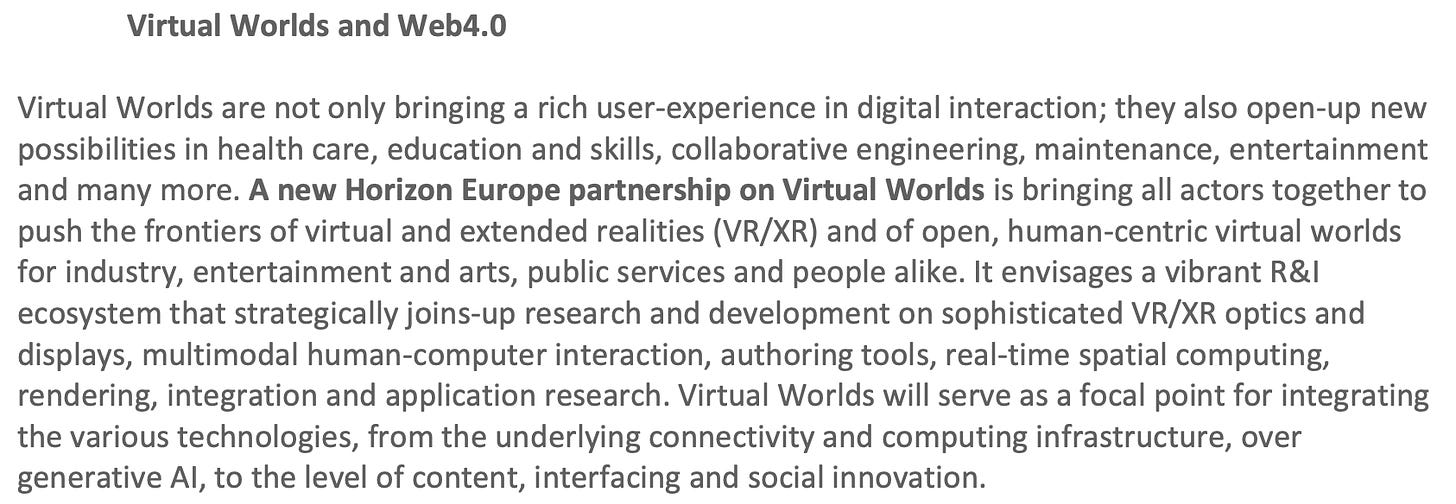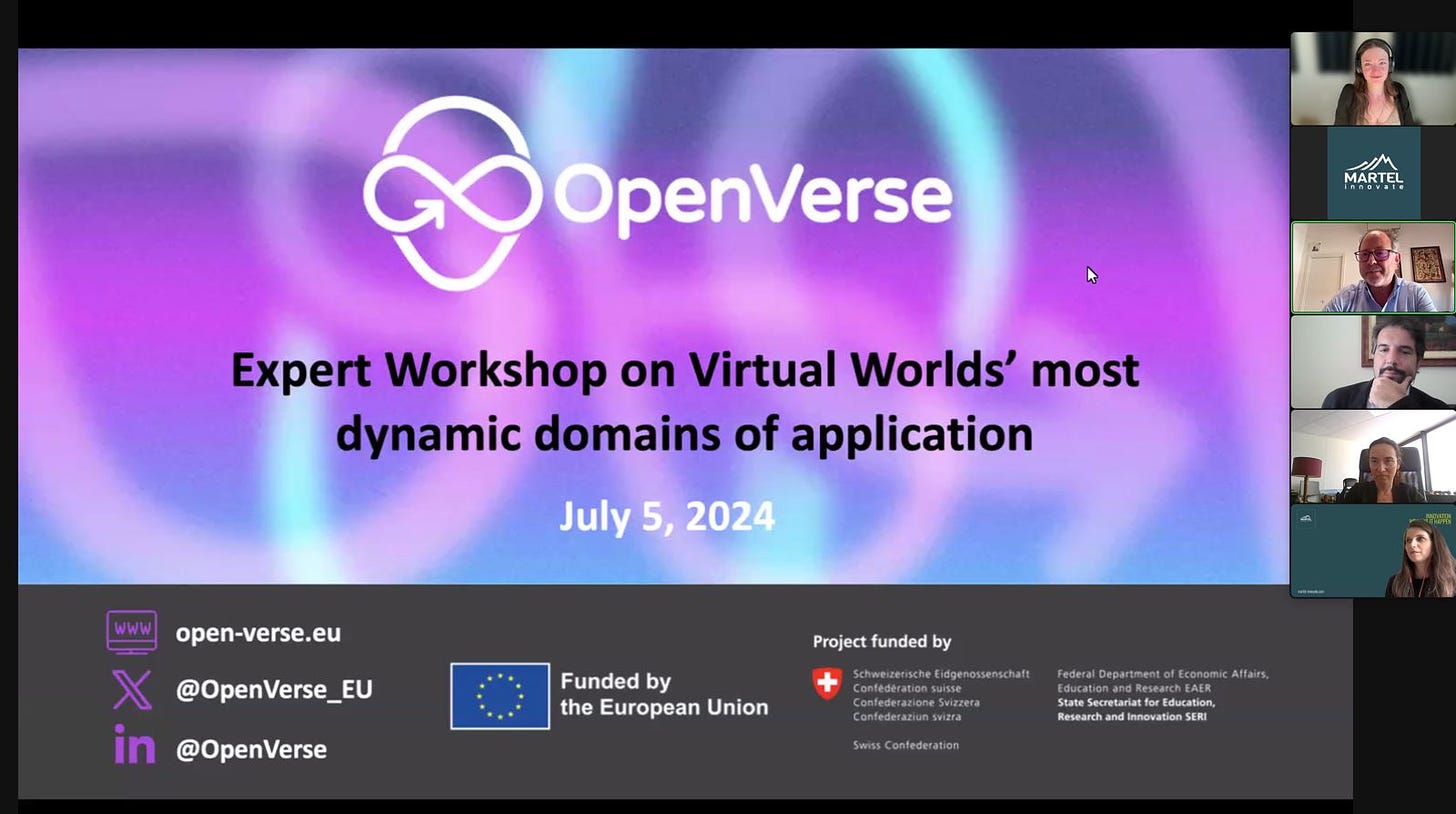Metaverse Policy Brief: 30.07
On regulatory sandboxes, the tussle for a European fashion icon, and digital twinning at the Olympic Games
Hello! Welcome to Metaverse EU’s Metaverse Policy Brief series. From September, we’ll provide biweekly (that’s fortnightly) updates on metaverse-related policy, business, and events in the EU while keeping an eye on global developments. Here’s a taster before the summer break.
🇪🇺 EU Metaverse Policy
🏢 European Commission
Competition. DG COMP, the Commission’s antitrust department, held a day-long workshop on “Competition in Virtual Worlds and Generative AI”. Takeaways:
International cooperation is needed to develop a joint vision of what virtual worlds should look like and enhance interoperability through standards.
Europe needs to create better conditions for European players, including opportunities for investment and scaling.
Own-initiative reports. The Commission responded to the Parliament’s virtual worlds initiatives:
Metaverse EU is archiving institutional documents here.
Regulatory sandboxes (1). The Virtual and Augmented Industrial Coalition held its second meeting of the year to discuss virtual worlds regulatory sandboxes.
Online safety. The Commission’s June edition of its Better Internet for Kids bulletin focused on virtual worlds, featuring interviews and presentations with representatives of Finnish and Dutch Safer Internet Centres, the Interactive Technologies Unit at the European Commission, Video Games Europe, and the Joint Research Centre.
Consumer protection. Together with national authorities, the Commission completed its biannual review of consumer protection trends. Its working document warns, “The rapid development of virtual worlds is also a possible source of unfair practices such as hidden advertising”.
The next mandate. In a widely-circulated leak of the Commission’s “briefing book”— a note prepared for the 2024-2029 Commission—DG CNECT (the tech department) cites the potential of virtual worlds and what’s needed from a technical perspective.
🗳️ European Parliament
Legislative gaps. MEP Axel Voss, re-elected in June, will continue as the Legal Affairs Committee coordinator for the European People’s Party. Voss co-led one of Parliament’s reports on virtual worlds and included on the agenda for his next term, “regulating virtual worlds”.
Neurotechnologies. The European Parliamentary Research Service published a study on the “protection of mental privacy in the area of neuroscience”, which looked at ‘neurotechnologies’ such as virtual reality, EMG wristbands, and headbands, and suggested the need for a “Neurotechnologies Act”.
🏛️ Member States
Regulatory sandboxes (2). The Virtual Worlds Steering Group held its second meeting, in Luxembourg, where Member States discussed regulatory sandboxes—possible use cases and obstacles. Minutes from that meeting here.
Digital twins. The Twin it! 3D for Europe's culture exhibition, a collaboration between the Culture Heritage Data Space and the EU’s Member states to create digital twins of all monuments and cultural sites deemed at risk and 50% of the most physically visited by 2030, is now fully available online.
🔄 Around the Bloc
📚 University of Alicante’s Academic Chair for the Responsible Development of the Metaverse published 16 papers selected for a Special Issue of the Interactive Entertainment Law Review. The researchers assess the application of EU laws including the GDPR, the Digital Services Act, IP protections, and advertising regulation.
♾️ The Openverse project held its first expert workshop on Virtual Worlds’ most dynamic domains of application, providing insights into questions around data governance and human-centricity and the potential of enabling technologies like IoT and 5G/6G in boosting the demand side of virtual worlds. More workshops will follow.
Business
Stereopsia, an international forum dedicated to immersive technologies and the only XR conference in Brussels, launched open calls (for demos, presentations, projects, and partners) for its 16th edition, taking place from 9-11 December 2024.
🇫🇷🇮🇹 EssilorLuxottica, a French-Italian fashion giant that has collaborated with Meta on its smart glasses, is in talks to sell a stake to the tech giant. Meanwhile, Google is courting the company to put its own AI model in future smart glasses.
🇩🇪 Cureosity, a medtech company that develops therapy based on virtual reality, secured €4 million in funding.
🇫🇷 Lynx CEO Stan Larroque announced it will soon ship a new batch of headsets, after a tough year of fundraising.
🇩🇪 Siemens will use digital twins to simulate acoustics for the first time at the Großer Festspielhaus, an opera hall in Austria.
🇮🇹 La Biennale di Venezia has announced the lineup and competition for Venice Immersive, featuring innovative virtual reality and immersive experiences.
🇫🇷🇩🇪 France and Germany will be the first countries in Europe to get their hands on Apple’s Vision Pro, as Apple finally expanded its global roll-out in July.
🇫🇷 Paris Olympic Games organisers are working with OnePlan, a UK-based company, to build digital twins of venues, allowing organisers to prepare logistics remotely (e.g., where to place cameras and how to manage crowds)—more case studies here. Meanwhile, Olympic swimmers are using digital twins to improve performance.
🌐 Global Corner
This section comes with the help of Metaverse EU’s anonymous contributor
🌍 The World Economic Forum published a new report, Metaverse Cybersecurity: Building Resilience in the Future Internet, focusing on privacy, virtual assets, safety, and the security of political systems. Read more.
🇺🇸 Meta launched Ocean, an open-source, interoperable XR developer framework that supports iOS, Windows, Linux, and more. Read more.
🇿🇦 South Africa’s SingularityU Summit will feature a metaverse track and a metaverse version of the event for those who cannot attend physically. Read more
🇮🇳 MediSim VR launched the first VR Medical Training Centre at Sri Ramachandra Institute Of Higher Education and Research in Chennai. Read more.
🇺🇸 Meta’s Horizon Worlds rolled out globally to all countries where the Quest headsets are sold. Read more.
🇦🇪 Zayader, a decentralised gaming project, is partnering with local authorities in the Middle East to provide accurate, educative, and immersive historical content, including interactive exhibits and twins of scared sites. By promoting the region’s cultural heritage, the project aims to spark real-world tourism. Read more.
🇬🇧 The LSE Business Review offers strategic advice for financial institutions aiming to stay competitive in the Metaverse, including on integrating digital currencies, utilising blockchain technologies, and developing new financial products suited for the Metaverse. Read more.
🇺🇸 Matthew Ball, the author of the influential book The Metaverse (2022), published a revised copy, The Metaverse: Building the Spatial Internet. This copy updates most of the content and adds new chapters on AI and the progress of XR devices. Read more.
🇮🇳 HSBC taps metaverse to win business from India’s wealthy diaspora. Read more.
🇺🇸 Google made its Blocks software, which creates 3D objects in virtual reality, publicly available. Read more.
Events
02 – 04 Sept European Big Data Value Forum (Budapest 🇭🇺)
16 Sept Towards networked Local Digital Twins in the EU (online)
24 Sept Open Discussion on Metaverse Ethics (Brussels 🇧🇪)
23 – 24 Oct NEM Summit (Brussels 🇧🇪)
29 – 30 Oct AWE EU 2024 (Vienna 🇦🇹)
04 – 06 Dec Immersive Tech Week (Rotterdam 🇳🇱)
09 – 11 Dec Stereopsia (Brussels 🇧🇪)





